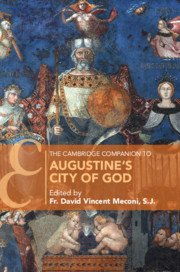Book contents
- The Cambridge Companion to Augustine’s City of God
- Cambridge Companions to Religion
- The Cambridge Companion to Augustine’s City of God
- Copyright page
- Dedication
- Contents
- Notes on Contributors
- Preface
- Abbreviations: Works by Augustine
- 1 Introduction
- 2 Book 1
- 3 Book 2
- 4 Book 3
- 5 Books 4 & 5
- 6 Books 6 & 7
- 7 Books 8–10
- 8 Books 11 & 12
- 9 Books 13 & 14
- 10 Books 15 & 16
- 11 Books 17 & 18
- 12 Book 19
- 13 Book 20
- 14 Books 21 & 22
- 15 Epilogue
- References
- Index
- References
8 - Books 11 & 12
Angels and Demons: The Eternal Framing of the Two Cities
Published online by Cambridge University Press: 21 August 2021
- The Cambridge Companion to Augustine’s City of God
- Cambridge Companions to Religion
- The Cambridge Companion to Augustine’s City of God
- Copyright page
- Dedication
- Contents
- Notes on Contributors
- Preface
- Abbreviations: Works by Augustine
- 1 Introduction
- 2 Book 1
- 3 Book 2
- 4 Book 3
- 5 Books 4 & 5
- 6 Books 6 & 7
- 7 Books 8–10
- 8 Books 11 & 12
- 9 Books 13 & 14
- 10 Books 15 & 16
- 11 Books 17 & 18
- 12 Book 19
- 13 Book 20
- 14 Books 21 & 22
- 15 Epilogue
- References
- Index
- References
Summary
In the first ten books of ciu. Dei, Augustine makes his case for Christian beatitude against the worldly glory of pagan Rome. Book 11 is a pivot. There he tells us – and now “we” seem to be his Christian and not his pagan readership – that we know best of the City of God, that eternal thing that peregrinates through time, from the witness of sacred writings, Psalms especially (87:3, 48:1–2, 48:8, 46:4–5), and from the inspiring love of the city’s founder. Most of us, most of the time, mix self-interest into that love and obscure for ourselves the beauty of the beloved. The moral is not that love must be selfless or worse, self-loathing, but that sacrificial love, sensing what is holy, practices humility. The great mediator between heaven and earth, the Son of God, takes up a human life, his own, without ceasing to be God. His is the original act of humility – think of it also as first love – that speaks consistently through the Scriptures and renders them authoritative (ciu. Dei 11.3). While sin makes it impossible for a mind used to the dark to endure the relentless illumination of pure divinity (incommutabile lumen; ciu. Dei 11:2), Augustine reminds us that we have, by way of mediation, a text to interpret and a spirit of humility to bring to the reading.
- Type
- Chapter
- Information
- The Cambridge Companion to Augustine's City of God , pp. 145 - 166Publisher: Cambridge University PressPrint publication year: 2021



